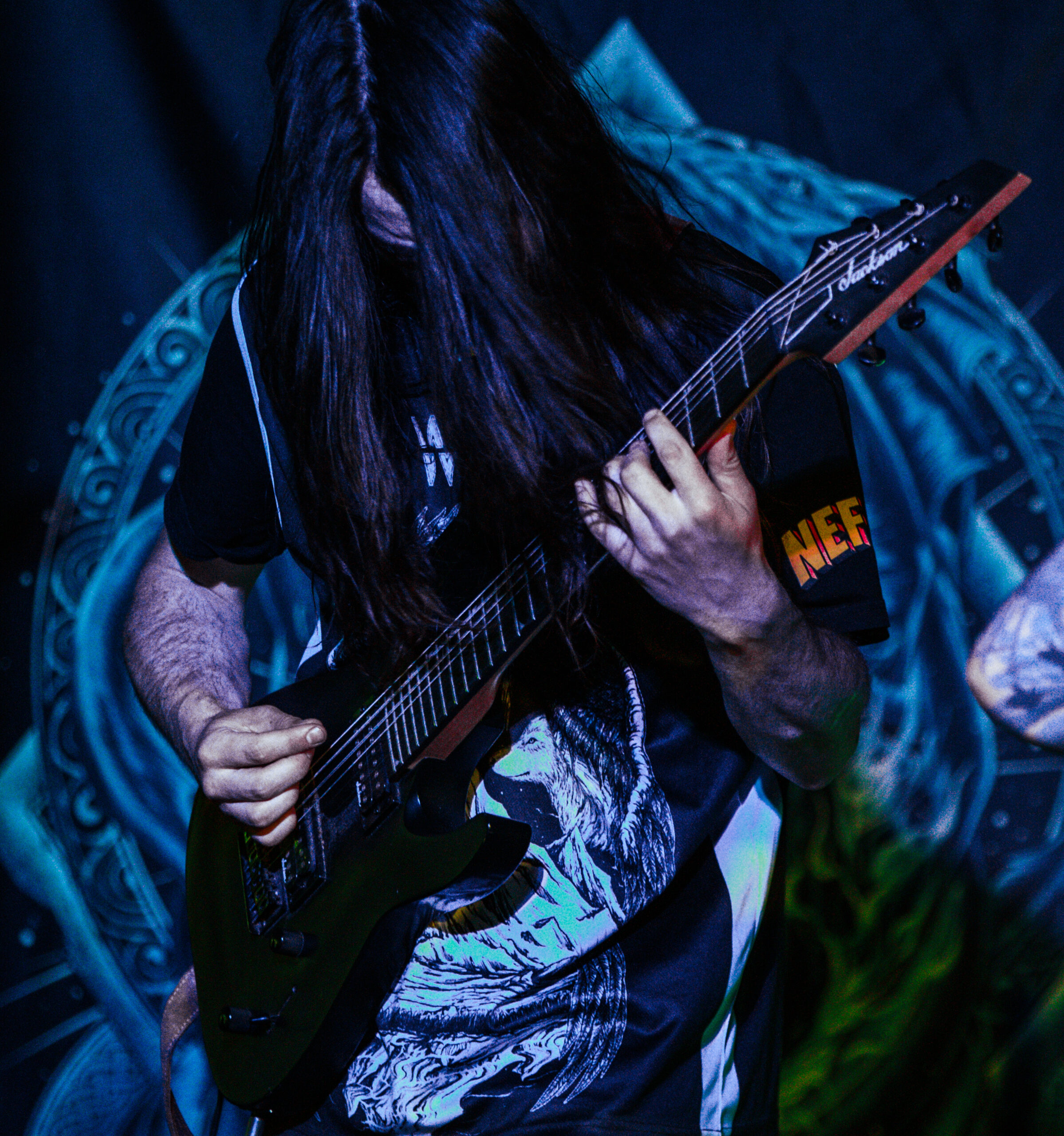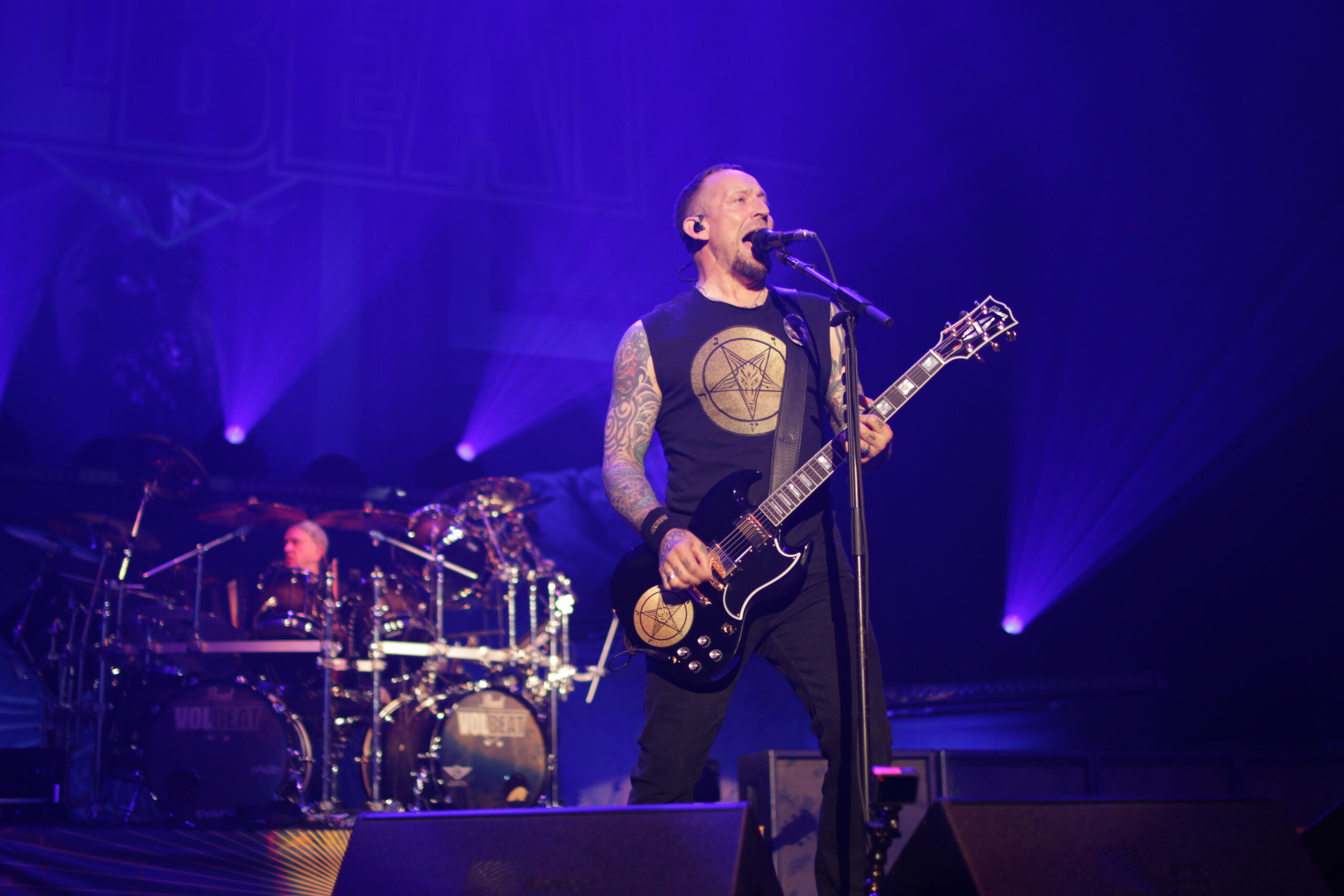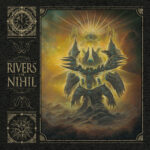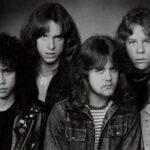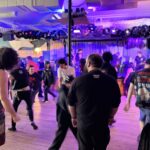Now Reading: Interview with Murray Emery of Prisoner | Mike On Metal Interview #2
-
01
Interview with Murray Emery of Prisoner | Mike On Metal Interview #2
Interview with Murray Emery of Prisoner | Mike On Metal Interview #2
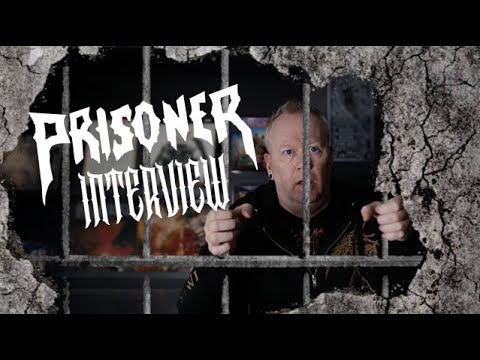
In this latest episode of the Mike On Metal YouTube channel, I sit down with Murray Emery of Prisoner to talk about their new album, touch on the album cover and singles artwork, and the band’s current tour. We dive into the influences that shape Prisoner’s sound, explore the thought process behind their striking album cover, and chat about life on the road during their Kill The King Tour. Murray also opens up about the unwavering support he’s received from his parents throughout his career, and how he’s giving back to the local music scene that helped him get to where he is today.
🔥 Topics covered in this video:
- The making of Kill The King Prisoner’s musical influences and evolution
- Insights into the album cover art
- Life on the road during the current tour
- Murray’s dedication to supporting the local music scene
- The impact of family support in a music career
Video Transcript:
Introduction
Mike: Welcome back metalheads. We’re here with another interview. This time I’m talking with Murray Emory of the band Prisoner. So Prisoner is what I would call a thrash crossover band – more on that in the interview though. You’ll actually get a better understanding of why I put it that way.
I also talked to Murray about what it’s like growing up with having fully supportive parents in an industry such as heavy metal or even just the music industry in general. We talk about some of the influences that are on the album, we also get into a little bit of a backstory on how the album’s title “Kill the King” and the title track came to be. We talk a little bit about cover art – it was really just a great conversation overall, sitting down with Murray to talk about everything from musical influences to his background, not just in music but also other things in his life that helped kind of influence where he’s at now – both as a musician, a business owner running a studio, helping out local bands, and even touring.
All right, enough chatter from me. Let’s move over to the interview.
Album Discussion: “Kill the King”
Mike: So I mean, we might as well just hop into it. I get the really important stuff right out of the way. The new album coming out June 20th, “Kill the King.” I got early access to it from the PR firm, of course, that we’re working with. Loving the album. I’ve listened to it probably a dozen times now. I play it on my trips back from Calgary when I go up there to see shows. I play it locally here in the office when I’m just chilling out or working. It’s honestly a really good album.
Now, the one thing that I did notice about it – “Kill the King” being the title, there is a track on there “Kill the King,” nothing else seems to really tie into it. So where did the title track come from? How did you make that decision that that was going to be the song that was going to be the title track for the album?
Murray: Yeah, so the title track kind of came to be in terms of the creative process from back when we were doing the first record. I had kind of created a concept visually from the first album through the EP to now, where it follows our character Davey through this developmental period.
From the first record where he’s in a cage, his body language is very compressed and small, and there’s obviously visual representations to different things in terms of the bird cage and the room that he’s in. Then you transition to the EP where he’s… you get more up close and personal, you can see his face, you can see a lot of the characteristics in terms of being sort of human, but he’s very different in that regard – obviously skin color, the wings, the whole nine yards. But you can see that he has some sort of power with the fire and the house of cards being the main focal point for that artwork.
And of course, the single artwork for “Skies Are Black” – you get more of a setting looking out that window that’s reminiscent of the same shape from the first album. And then now with “Kill the King,” where he’s sitting on top of a throne, everything around him is completely obliterated. It’s a very upfront, aggressive statement in terms of the visual aspect.
And that was one of the songs that I had written back when I was 17, 18, that became fully developed as I was growing into what Prisoner is now. And that’s where the title track came from, because it’s more of a conceptual structure from the first album to now. Where if you look at everything and you put our artwork down side by side, the goal is to basically tell a visual story as well, where the listener and whoever’s interested in the band can basically build their own kind of story around guidelines of what we’ve created as a band.
Because there’s a lot of artists that do concept records and everything kind of ties into one big thing, and then this is its own entity of art and then it moves on. For us, our entire goal is to always kind of create something that is all-encompassing. And that’s what I’ve wanted to do from the time that I started Prisoner.
And the music – I’m sure you’ve gathered from listening to the album itself – is very dynamic in terms of where we go from the ballad to one of the heavier songs like “Double Vision.” So it becomes all-encompassing across an entire spectrum rather than being confined to one singular album.
Genre and Musical Style
Mike: Well, and even not confined to one singular genre, right? Because the PR release that I got said that you guys were a thrash band, which I mean, I hear touches of that on the album, but I don’t necessarily… I mean, myself, I wouldn’t personally peg you guys into being a thrash band, right? You’ve got some really killer riffs on there that do fit a thrash genre for sure, but you hit so many other genres, right? I mean, there’s touches of prog in some of your guys’ songs, there’s touches of like melodic death core almost in some of the riffs that are on there. Even your vocal styling changes between different songs.
So I mean, if you had to pick a genre, would it be like a combination of genres that you would say that you guys are, or would you say that you are a thrash band just with different elements inside the songs?
Murray: Honestly, if I had to pick, I would just consider ourselves a traditional heavy metal band, because we do cover so many different elements. We all are inspired by different things. Like, I range from ’60s folk music like Nick Drake up to tech death like Archeon, and I’ll listen to all that same stuff in the same day, because for me I’m just a fan of music, whether that’s heavy or not. I mean, I grew up on rock and roll obviously, and that’s why I play the genre that I do.
But I wouldn’t necessarily want to pigeonhole ourselves in terms of like, “we are a thrash band” or “we are a deathcore band.” We are an all-encompassing rock and roll heavy metal band that explores and experiments. And I think that there’s a lot of bands that kind of do that from album to album, but not necessarily throughout their discography. And for me, I think that’s what makes us very unique and puts us in a category where you can listen to us in any mood, and it’s not necessarily being the guy that’s an elitist when it comes to the metal subgenres or whatever it is.
Because I can definitely be that guy, and when we discuss different bands as fans of music, we definitely bring those ideas and points into the conversation. But I think for us, we just kind of are an all-encompassing rock and roll heavy metal band that isn’t necessarily finding their sound, because I think we do have it. And that could be the first kind of interpretation for many people coming across our music for the first time, because it is so dynamic. It’s like, “Oh, they don’t really know what they’re doing yet in terms of genre.” But I think we’ve definitely found a sound – it’s just everything is different, but we have that all-encompassing element that is Prisoner.
Mike: Nice, yeah, that makes sense. And again, I mean, just as you were talking about that, I can think about the different tracks on this album, right? And it just flows, whereas a lot of bands they have their phases – like you said, they go through a thrash phase and they go through like a melodic phase – and you’ve kind of done that on each album. And actually, I can hear it. I listened to the first release, the first album, last week just after I saw you guys. I hadn’t heard it yet – I had only been listening to the new one – and you can hear it there too. So I mean, even at a young age, you kind of had this ability to kind of combine different genres into an album. It’s pretty impressive.
Murray: Thank you.
Tour Discussion
Mike: How’s the tour going, by the way?
Murray: It’s been great, honestly. We’re having a blast, and the turnouts for the shows have been awesome, and everyone that’s come has been nothing but positive and excited. And of course, the hometown show that just happened was unreal. It was probably the biggest local show that we’ve had in Calgary for us, and it was awesome to see friends and family at the shows and seeing where the band’s developed from the EP era, where we were really just trying to figure out who we were as a live band, because we had a full-on lineup change last year.
So now it’s putting us all together in vehicles and traveling day in, day out, and just playing music has been – it’s the dream for all of us. So it’s been fantastic.
Mike: Nice, that’s good. You’ve got two dates left in Alberta – Red Deer, Edmonton, Friday, Saturday?
Murray: Yes, so we’ll be Red Deer, Edmonton on Friday, Saturday, the 13th and 14th of June. And then we’re off a little bit during July just because Stampede here in Calgary, and we’re all super busy with that – for me in the studio and renting out gear and things like that. And then come August, we’re heading out to Ontario, so we’ll be… got another seven or eight shows out there.
Mike: Yeah, I saw you’re hitting like… I think you’re going to Winnipeg, a couple of other stops in between?
Murray: So Brandon, Winnipeg, Thunder Bay, and then in Ontario we’ve got obviously Thunder Bay, we’ve got London, Hamilton, Toronto as well.
Mike: Nice, excellent.
Family Support and Upbringing
Mike: So one of the things I spoke with your dad when you guys were here… I was actually asking for the tour manager, and your sound guy Cody told me to go talk to the gray-haired gentleman in the hat, and I was like, “Okay.” So I go over and start chatting, and we’re just kind of discussing things, and just the tone that he had when he was talking about you, and the fact that he really only talked about you, kind of gave it away. But I didn’t want to say anything at first because I was like, “This guy’s talking like a parent, right? Not like a road manager or like a tour manager.”
So he just… glowing review of you, not only as a musician but as a person, which I found just so endearing. Now, how do you think that kind of support – because he also said that he fully supports you in everything that you’re doing, like 100%. He’s behind you with this. Win, lose, draw, fail, whatever – he supports you, he believes in you.
That’s so rare to hear from a lot of parents, right? Like, I mean, I grew up in a house – and this is no diss at my parents, I love my parents to death – but I grew up in a house where it was like, “I want to learn how to play guitar, join a band, I want to be a heavy metal singer for the rest of my life,” and it was like, “not under this roof.”
So I mean, seeing a parent that has kind of nourished this in you or helped feed this in you and is there with that kind of support, how do you think that’s affected kind of your journey in the industry?
Murray: Honestly, I think it’s every advantage in the book, because at the end of the day, you need at least one person to believe in you. And I’m very lucky that the one person has been my dad, and of course my mom as well in that regard. And just my parents – they’ve been… they saw what I’ve been doing.
And I grew up around them working for my parents’ commercial construction company and things like that. So I grew up working around my father, and I learned a lot of his work ethic and how to talk to people, how to do those things. And he instilled a lot of those adult-level life skills in me as a teenager. I’m 13, 14, pushing a broom, and then you’re hanging drywall, and then all of a sudden you’re running sites because you’ve been on sites for seven, eight years.
And it’s been just a development for me as a person. So for him to see all of those things, and then go, “Okay,” you know, I come home and I’m like, “I want to play guitar.” Like, “Yeah, okay, well, whatever,” because I was a sports kid. I was playing hockey, doing martial arts, baseball, the whole nine yards. And totally pun intended on that – I just realized that.
But I picked up music at like 15, and I had always liked rock music. My dad and I always bonded over that, and we listened to it in the car and things like that. But they were like, “Yeah, we’ll get you a guitar or whatever it was.” And then I just sat and played in my room and became obsessed. And then when they realized, they’re like, “Okay, like he actually cares about this,” they started to really support what I was doing.
And they’re like, “Okay, well, if you’re going to try to go into music, you need to understand that being just a guitar player is almost impossible. You need to basically set yourself up to be a part of the music industry. And how are you going to do that?”
So I sit and I research – I’m 17, 18 years old, and high school’s almost over, and what are you going to do with your life? Well, my whole thing was I still wanted to be a guitar player, and I was writing music and doing the things, but it was how do you involve yourself in the music industry?
And just like the construction industry, where I grew up as a laborer into a drywaller to a GC – sight super – I’m learning everything about the industry from planning to execution as well as setting things up and all that. So I took that as almost a direct correlation to how I wanted to build my life in the music industry.
And I looked at the educational avenues, and I looked at how the industry was set up from the business side of things to the tech side to the musical side of things. And I just went to school for those sorts of things and tried to build my own music degree over three to four years, so that when I came out of it, I had as much foundational knowledge as possible.
So then they see all of that, and their support just continues to grow. And it was purely from their guidance to be like, “You need to figure this out.” And it wasn’t like “do this or else.” It was like, “If you really want to do this and you believe in yourself and you believe that this is what you’re meant to do, do as much research as you can and figure it out, and we’ll be behind you and talk to us. And if we agree with it, we’ll help you.”
And it’s been the last five, six years of my life. And I will genuinely say that my dad is my best friend, and so is my mom, because they believe in me and they want to see me succeed. And they’ve done everything in their life to put myself and my sister first to give us the biggest advantages as we can in life.
And for me, I need to continue to work my ass off to not validate that, but they put so much time and effort… and it would be a waste if I was just lazy or, for lack of a better term, not a very good person about it. So I do my best to try to reciprocate that with the people around me and take care of my friends and my people and my family, which is my band, and of course my parents and everything else.
And it’s become an all-encompassing community for us. And I think that’s why my parents are so excited about this, because they grew up in the ’70s and the ’80s with all the band guys and this and that and people playing music and the sex, drugs, rock and roll. But for them to see the family dynamic that we’ve created in young people where we’re succeeding together, I think is an anomaly. And there’s not many people that can go around in life in general and say that they have four or five best friends that they would be willing to do literally anything for, especially from 20 to 25, where we’re all constantly changing as people.
Mike: Yeah, for sure. That’s… I love the story. I mean, it’s amazing.
Studio and Community Building
Mike: Now, talking on that, you talked a little bit about community, you talked about providing support. One of the things that your dad did mention is you’ve got your own studio that you’ve set up, and that you help support like local bands to give them studio time, help them get demos done and EPs done and things like that.
So what kind of took you away – or I don’t want to say took you away – but what progressed you from just wanting to be a musician and understand the industry to actually opening your own studio and running it?
Murray: Well, I think the big thing was just wanting to know everything. I’m that kind of person – when I become locked in with something such as music, I want to understand everything about it, and that includes the recording process.
So I went to SAIT and took a two-year broadcast program there and learned how to fix audio and video equipment in radio, TV stations. So I learned the foundational knowledge of low-voltage electronics, all that stuff, so I could fix all of the gear, I could talk the technical lingo with people at that level.
And then I went to OIART in London, Ontario, and went for audio production. So I learned how to record for music, audio for visual media. I learned about acoustics, and then combined that with my construction knowledge. I fell in love with recording and, of course, the acoustics aspect of it.
So I ended up spending some time in Ontario, and the band was doing things there with the original lineup. And then I moved to California for a few years just to understand the music industry, to be there. I was going to shows, I was hanging out with some guys that went to Musicians Institute. One of which is a singer in a band called Vela LaVella, so I watched that band develop out of the States. And just tried to learn as much of the industry as possible. I was in sessions doing things like that and engineering and stuff.
And then when I came back to Calgary, I looked at the market. I’m like, “This is completely unsaturated. There’s a need for something like this,” because people are looking for the next big city. And I think Calgary, at a growing rate of over one and a half million people, I think is the next big place, because you’re close to your Vancouver and LA time and things like that, and it’s very central to the West Coast.
And if I can build a studio not only for my band where I can save a bunch of money on recording, but do plan A meets plan B… because I know at the same time, I don’t want to be putting on skinny jeans and driving around in a van when I’m 45, 50 years old to just send my kids to college. I want to be exactly like my parents and be involved and supportive in my kids’ life, because that’s what I want to do as well.
I needed to build not the backup plan, but the plan that made sense for me as my career progressed as a musician, whether I got to play music full-time or not. And for me, it allows the band members as well to do session work and things like that and push themselves to branch out to other genres. So again, creating that family, community dynamic.
And then setting myself up to… if I want the industry to change, I need to be a part of that industry and advocate for those things. Because I remember when I was 17, 18, I couldn’t find anybody that wanted to play rock music. And I’m renting a PA from Long & McQuade and driving two hours across the city in rush hour to set up this PA in a guy’s basement to play three songs, and then the guys want to go and get stoned. And for me, that wasn’t it.
So I wanted to be somebody to be in the community, going to shows, being an engineer, and being the guy that can be like, “Listen, if you want to do this professionally and raise the standard for local music, you need to have the time and the patience to teach people your age or younger, and take the older people and give them a reason to mix with the younger people.”
Because as the older people continue to do the music thing, their audience ages out, they start families, their jobs become more important… it becomes the thing. You need to get the young people looking at the older people and seeing the quality of music, but also the older people guiding the younger people to bridge that gap. And I’m kind of in that weird middle age at 25 where I hang out with both.
So if you can create that standard, the quality of local musicianship goes up, more people want to go to the music scene and go to shows and support bands like that. And then you actually have a scene that’s viable, because if you continue to push the same four or five bands from the ’70s and the ’80s, this industry and this genre will die. And I’m a firm believer of that.
So if you want to be a part of this, you need to be a catalyst for change. And that’s been my entire… not outlook, but it’s been my goal as a person in the industry, whether I’m a musician, an engineer, producer, or any other term you’d like to put me under as part of the industry.
Mike: Yeah, amazing. I’m here to support you no matter what – I mean, any way I can. If that’s like, you got a young band that’s coming to Lethbridge and needs a little bit of promotion or they need photos of their sets or anything, just shoot me a quick message and let me know, and I’m there for you.
Murray: Absolutely. I really appreciate that, thank you.
Mike: I totally believe in everything that you guys are doing, especially you with like kind of everything that you’ve got and the stories that your dad was telling me. I was just… and again, I want to go back to that or harp on it, but it was just amazing, right? Like, you could just… you could tell the pride that he had in everything that you were doing and the way that he described you and all the stuff that you’re doing and your degrees. And you’re a black belt, I believe, in taekwondo?
Murray: Karate. I have my fourth-degree black belt in taekwondo. Yeah, I trained from the time I was four till about 22, and I started teaching at 15. So that’s been… that was a very large part of my life. And I think that’s not where all of my discipline came from, but it started as me being a crazy kid. My parents are like, “We need to get energy out of this thing.” And I just excelled at it, and it became something that was my life for a very long period of time.
And it being a very disciplined art form, I think it helped with my development in terms of how I go about life, in terms of what my core values are in terms of respect and commitment and things like that, and really not overdoing things but pushing myself to be the best version of myself that I can be.
Mike: Nice. I think you appreciate that. I’m pretty sure you’re there.
Murray: Thank you, I appreciate that.
Vocal Development and Recording Process
Mike: Two last… kind of final questions. Got one about kind of your style. Now, the vocals on the album – they’re different than the live version of you. Like, I can hear like a complete difference between… which I know there’s normally a bit of a difference between live and recorded. But have you changed your vocal styling for your live presentation, like your live shows? Or what’s the difference that I’m hearing there?
Murray: Well, I think part of it is the fact that I do all of the harmonies and backing vocals and stuff, except for the chants on the record. We’ve got Marco and Trevor doing those, and really pushing ourselves in that. And honestly, I think the other big difference was the fact that this album came together so fast. There was melody lines and phrases that I was working on with Reid in terms of production while we were in the studio, and I was figuring those things out. And we were capturing that raw transition and aggression, and I think that translates to the album very well.
But then being on the road and really working on these songs and solidifying the placements and the choices and really strengthening my voice in that regard… I think you’re honestly… I think we’re just hearing the development of myself as a vocalist in that period of time in the last three to four months, where the songs have just become all-encompassing for me rather than just kind of… not learning, but really being open-minded and kind of off the cuff with it.
Because that’s kind of what we wanted with this record, where we started writing this album in October of 2024, and we were done tracking by the end of April. So it was a very, very fast transition from “hey, let’s make a record” to “okay, here’s the finished product.”
So I think that had a large part to play in that. And for me as well, I was a guitar player first. I never really wanted to be the vocalist, but then I became the vocalist three months before we tracked the record the first time back in like 2022.
And it’s become the same thing as guitar, where I just am trying to be the best I possibly can for that. And I know my guitar playing’s here and my vocals were here, so now my goal is to bring them up to the same level and then just progress consistently and evenly at both. So I honestly think I’m just seeing a lot of the progression and the fruits of the labor in that regard in terms of the live setting.
Mike: Nice. Yeah, I mean, the vocals on the album aren’t bad – that’s not the point. There’s just a clear… you can hear a clear difference. And like you said, I think it is like a comfort level or a learning process that you’ve kind of went through since the recording to now. And yeah, I honestly can’t wait to hear the next album now.
Murray: Awesome, that’s great to hear.
Musical Influences
Mike: Last question – one that I’m going to be asking everybody that comes on. So we talked about heavy metal, and that you’re kind of influenced more in heavy metal. That’s kind of what you would genre the band as. But what one genre kind of outside the realm of heavy metal would you say most influences either you as an artist or even the album?
Murray: I would probably just say blues, just because that’s what I grew up playing. That’s what I kind of started with, and especially Trevor as well, because he grew up on classic rock. And I mean, Carl comes from a jazz background, but combining like… he’s only been playing metal music for the last year and a half.
Mike: Wow.
Murray: So for him, like, he’s been really developing his double pedal skills and things like that and listening to where heavy metal came from. So all of his influences were from like the mid to late ’60s into the ’70s and ’80s into what is modern heavy metal and things like that. But he was like, “Give me bands to study, give me bands to learn about.”
The way he listens to music is he processes entire discographies in order because he wants to see the development of these musicians and this genre of music or style of music. So he takes a lot of these elements and then takes his… I call them “jazzisms”… and combines what he knows with what he’s learning and puts it towards Prisoner with the influence of my phrasing, my riff styles, things like that, and Trevor’s bass playing.
And then of course, Marco comes from the same background. Like, we fanboy and geek out about Thin Lizzy and bands like that that come straight from the blues world. So for us, I think that’s where a lot of our stuff is rooted in terms of phrasing and riffs and things. But a lot of it just kind of comes off the cuff for what we do, because all three of us besides Carl are all completely self-taught and we’ve learned off a YouTube type of thing.
Mike: Amazing. Crazy. I would have been a much better guitar player if we had YouTube back in the day.
Murray: Absolutely. I think it’s definitely an advantage nowadays, and that’s why we’re seeing such a transition in terms of technicality and musical ability. There’s so many crazy bands that are just so good at their instruments because all they do is sit and practice. And it’s almost like a cheat code where you can go and watch and take different things from other elements and learn at such a fast pace if you put your mind to it.
And I think at the same time, now there’s a space in music for bands like us where we are technical, but you can always bob your head to our music, and it’s simple enough to listen to. But if you dissect it, there’s a level of complexity underneath. And I think that’s what people are really starting to look for now, because it’s not the super basic, simple stuff, but it’s also not so over-complicated that only musicians can appreciate it. To kind of sit in that weird happy medium, like I say, with even just the styling of what we are doing from song to song.
Mike: Yeah, nice.
Closing
Mike: Nice. Well, I mean, that’s all I’ve got for you, so I appreciate you taking the time to talk to me today.
Murray: Absolutely. Thank you so much for having me and wanting to chat with me about everything.
Mike: Yeah, great seeing a familiar face again, and it was nice meeting you last week at the show. Hopefully we get a chance to meet again and see you play live, and just… I’m excited to see you guys progress and see what comes next for Prisoner.
Murray: Absolutely. Thank you very much. You can follow us everywhere at PrisonerBandOfficial on all social medias, whether that’s Instagram, TikTok, Facebook, Twitter, all of those fun things. And you can check out our website at www.prisonerband.ca for all of our tour dates, merchandise. We do have our new record available there once we hit the release day, June 20th. So head over there if you’d like to find a physical copy or pick one up at a show.
Outro
Mike: So that was it, metalheads – interview with Murray Emory of the band Prisoner. I hope you take the time to actually go and check out the new album when it drops on June 20th. It’s a great album. Also, if you have the chance to see them, they’re currently touring. They’ve got two shows left – one is tomorrow night in Red Deer, which is June 13th. The next is June 14th in Edmonton. After that, they’re taking about a month off like Murray said, and then they’re going to be touring kind of across Canada through the month of August. So if you get the chance, by all means go and hit them up.
So that’s it for this one, metalheads. As always, support your local scene, buy the damn album, and stay heavy.


